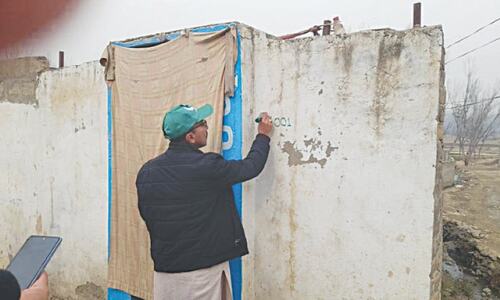WASHINGTON: Prime Minister Imran Khan reminded the world on Sunday that India’s Hindu supremacist government had annexed a disputed territory in violation of international laws while a leading candidate for the Democratic Party’s presidential ticket urged Washington to support a United Nations-backed resolution on Kashmir dispute.
“The [Indian] government wants to change the demography; turning a Muslim majority province into a Muslim minority province by bringing in settlers,” said the prime minister while addressing a gathering in Houston, Texas. “This is a violation of the Fourth Geneva Convention Article 49. You cannot change the demography of an occupied land.”
Mr Khan used his video call from Islamabad also to highlight the link between India’s ruling Bharatiya Janata Party (BJP) and Rashtriya Swayamsevak Sangh (RSS), a Hindu supremacist group and the BJP’s parent organisation.
“I am trying my best … to make people understand this phenomenon which has taken over India,” he said. “The RSS genie has come out of the bottle and would not go back.”
Directly addressing some 30,000 people who attended the Islamic Society of North America’s 55th annual convention, Mr Khan said: “You have to make the Western societies understand the RSS.”
Bernie Sanders, an independent senator trying to win presidential ticket of the Democratic Party, broached a topic that has not gotten wide discussion in the campaign so far: He criticised India for revoking Kashmir’s semi-autonomous status.
Sanders in his speech at ISNA convention asks US to back UN’s Kashmir resolution
“India’s action is unacceptable. The communications blockade must be lifted immediately,” he said. “The US government must speak out boldly in support of international humanitarian law and in support of a UN-backed peaceful resolution that respects the will of the Kashmiri people.”
Mr Sanders also reminded the Muslim-dominated gathering that in 2002, he opposed the Iraq war, which, he noted, created instability in the Middle East and gave rise to the Islamic State terrorist group whose victims were overwhelmingly Muslim.
“I am also deeply concerned about the situation in Kashmir where the Indian government has revoked Kashmiri autonomy, cracked down on dissent and instituted a communications blackout,” the senator said, earning a warm applause from the audience.
“The crackdown in the name of security is also denying the Kashmiri people access to medical care. Even many respected doctors in India have acknowledged that the Indian government-imposed restrictions on travel are threatening the life-saving care that patients need,” he said.
Another Democratic presidential candidate, Julián Castro, commended Senator Sanders, who was standing nearby, “for being here” and for “a track record of speaking out on many of the issues that we addressed today.”
The organisers of one of the largest Muslim gatherings in the United States, recognised Mr Sanders and Mr Castro as the first among White House hopefuls to show up and address a voting bloc deeply alienated by President Donald Trump.
Mr Sanders got a particularly enthusiastic response as his speech covered issues specifically affecting the Muslim world, including in foreign policy. He was introduced by his campaign manager Faiz Shakir, who is Muslim.
“We must speak out when we have a president and an administration who believe — and I quote — that ‘Islam hates us,’” Mr Sanders said, referring to a comment Mr Trump made while campaigning for president’s office in 2016. “We must speak out at hate crimes and violence targeted at the Muslim community and call it what it is: domestic terrorism.”
Prime Minister Khan, who also received a warm applause, reminded the audience that the UN Security Council resolutions had given the Kashmiris the right to decide their own destiny through a referendum and these resolutions were still valid.
The Modi government, he said, was dominated by extremists who wanted to turn India into a Hindu state. And now they had “taken over a nuclear-armed country with a mad ideology,” he said. “The entire country is now being run by an extremist ideology, threatening the very fabric of the Indian society, as all minorities are being systematically targeted.”
The prime minister said that while the Muslims had no rights in this new India, other religious groups were not spared either. “The Christians are forcibly converted to Hinduism and their churches are attacked in India, while the Sikh community will soon face such a scenario.”
He warned that the BJP government could stage a Pulwama-like incident or orchestrate an attack inside Pakistan to divert the world’s attention away from Kashmir. They could do anything to hide gross human rights abuses, carnage and bloodshed in the occupied territory, he added.
Mr Khan said that such escalations would have very serious consequences, as this would not be happening in Rwanda or Bosnia but in a region where two large countries – India and Pakistan – had nuclear weapons. Pakistan would retaliate in a befitting manner to any aggression, he said.
The prime minister said Pakistan had already asked the Organisation of Islamic Cooperation to play its role to defuse tensions while he would raise this issue at the coming UN General Assembly session in New York as well.
“About nine million people are living under curfew. There’s complete communication shutdown and media blackout. People are picked up from their homes. Around 8,000 are in prisons and about 4,000 have been taken out of the valley,” Mr Khan said.
According to the ISNA, 230,000 people were on their Facebook at a time to watch Imran Khan. Audiences were from across the world. Over all, an estimated one million watched the speech through alternative feeds.
Published in Dawn, September 2nd, 2019













































